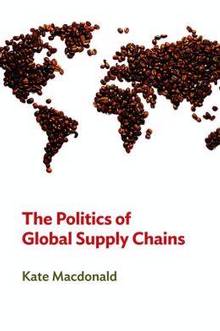Politics of global supply chains , The
MacDonald, Kate
Éditeur : POLITY
ISBN papier: 9780745661711
Code produit : 1271428
Catégorisation :
Livres /
Gestion /
Gestion des opérations /
Logistique et transport
Formats disponibles
| Format | Qté. disp. | Prix* | Commander |
|---|---|---|---|
| Livre papier | En rupture de stock** |
Prix membre : 28,45 $ Prix non-membre : 29,95 $ |
*Les prix sont en dollars canadien. Taxes et frais de livraison en sus.
**Ce produits est en rupture de stock mais sera expédié dès qu'ils sera disponible.
Description
The Politics of Global Supply Chains analyses the changing politics of power and distribution within contemporary global supply chains. Drawing on over 300 interviews with farmers, workers, activists, businesses and government officials in garment and coffee sector supply chains, the book shows how the increased involvement of non-state actors in supply chain governance is re-shaping established patterns of global political power, responsibility and accountability. These emerging supply chain governance systems are shown to be multi-layered and politically contested, as transnational governance schemes interact with traditional state governance arrangements in both complementary and conflicting ways. The book's analysis of changes to the relationship between state and non-state actors within transnational governance processes will be of particular interest to scholars and students of globalisation, global governance and regulation. The Politics of Global Supply Chains also suggests some practical ways by which the effectiveness and accountability of supply chain governance could be strengthened, which will interest both scholars and practitioners in fields of global business regulation and corporate social responsibility. Conclusions are relevant to the business and civil society actors who participate directly in non-state governance schemes, and to state regulators whose distinctive governance capacities could play a much greater role than at present in supporting transnational, non-state governance processes.























